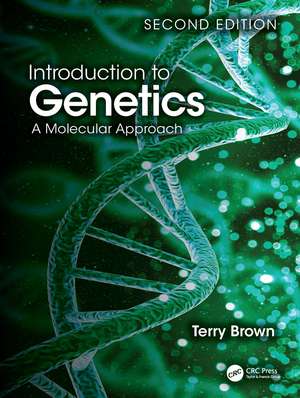Introduction to Genetics: A Molecular Approach
Autor Terry A. Brownen Limba Engleză Paperback – 20 ian 2025
This second edition has been thoroughly updated to cover new discoveries and developments in genetics from the last ten years. There are new chapters that introduce important techniques such a DNA sequencing and gene editing, and the applications of genetics in our modern world are covered in chapters describing topics as diverse as gene therapy and the use of ancient DNA to study prehistoric ecosystems.
Key Features:
· Provides a molecular approach to the study of genetics
· Highly accessible and well-structured book with chapters organized into four parts to aid navigation
· High-quality illustrations help to elucidate the various concepts and mechanisms
· Each chapter ends with a Key Concepts section, which serves to summarize the most essential points
· Self-study questions enable the reader to assess their comprehension of chapter content, and discussion topics facilitate deeper understanding of the material by encouraging conversation and critical evaluation
· Key terms are emboldened throughout the text and listed at the end of each chapter, and definitions can be found in the Glossary at the back of the book
For instructors who adopt the book, an affiliated question bank is free to download
| Toate formatele și edițiile | Preț | Express |
|---|---|---|
| Paperback (1) | 404.51 lei 3-5 săpt. | +52.27 lei 7-13 zile |
| CRC Press – 20 ian 2025 | 404.51 lei 3-5 săpt. | +52.27 lei 7-13 zile |
| Hardback (1) | 1025.38 lei 6-8 săpt. | |
| CRC Press – 20 ian 2025 | 1025.38 lei 6-8 săpt. |
Preț: 404.51 lei
Preț vechi: 425.81 lei
-5% Nou
Puncte Express: 607
Preț estimativ în valută:
77.40€ • 81.25$ • 64.25£
77.40€ • 81.25$ • 64.25£
Carte disponibilă
Livrare economică 20 martie-03 aprilie
Livrare express 06-12 martie pentru 62.26 lei
Preluare comenzi: 021 569.72.76
Specificații
ISBN-13: 9781032743530
ISBN-10: 1032743530
Pagini: 574
Ilustrații: 1370
Dimensiuni: 210 x 280 mm
Ediția:2
Editura: CRC Press
Colecția Garland Science
ISBN-10: 1032743530
Pagini: 574
Ilustrații: 1370
Dimensiuni: 210 x 280 mm
Ediția:2
Editura: CRC Press
Colecția Garland Science
Public țintă
Postgraduate, Undergraduate Advanced, and Undergraduate CoreCuprins
1. What is Genetics and Why is it So Important?
PART 1. GENES AS UNITS OF BIOLOGICAL INFORMATION
2. DNA
3. Genes
4. Transcription of DNA to RNA
5. Types of RNA Molecule: Messenger RNA
6. Types of RNA Molecule: Ribosomal and Transfer RNA
7. The Genetic Code
8. Protein Synthesis
9. Control of Gene Expression
10. DNA Replication
11. Mutation and DNA Repair
PART 2. GENES AS UNITS OF INHERITANCE
12. Inheritance of Genes during Virus Infection Cycles
13. Inheritance of Genes in Bacteria
14. Inheritance of Genes during Eukaryotic Cell Division
15. Inheritance of Genes during Eukaryotic Sexual Reproduction
16. Inheritance of Genes in Populations
PART 3. HOW GENES ARE STUDIED
17 Mapping the Positions of Genes in Chromosomes
18 Sequencing Genes and Genomes
PART 4. GENETICS IN OUR MODERN WORLD
19. Genes in Differentiation and Development
20. The Human Genome
21. Genes and Medicine
22. DNA in Forensic Genetics and Technology
23. Genes in Industry and Agriculture
24. The Ethical Issues Raised by Modern Genetics
PART 1. GENES AS UNITS OF BIOLOGICAL INFORMATION
2. DNA
3. Genes
4. Transcription of DNA to RNA
5. Types of RNA Molecule: Messenger RNA
6. Types of RNA Molecule: Ribosomal and Transfer RNA
7. The Genetic Code
8. Protein Synthesis
9. Control of Gene Expression
10. DNA Replication
11. Mutation and DNA Repair
PART 2. GENES AS UNITS OF INHERITANCE
12. Inheritance of Genes during Virus Infection Cycles
13. Inheritance of Genes in Bacteria
14. Inheritance of Genes during Eukaryotic Cell Division
15. Inheritance of Genes during Eukaryotic Sexual Reproduction
16. Inheritance of Genes in Populations
PART 3. HOW GENES ARE STUDIED
17 Mapping the Positions of Genes in Chromosomes
18 Sequencing Genes and Genomes
PART 4. GENETICS IN OUR MODERN WORLD
19. Genes in Differentiation and Development
20. The Human Genome
21. Genes and Medicine
22. DNA in Forensic Genetics and Technology
23. Genes in Industry and Agriculture
24. The Ethical Issues Raised by Modern Genetics
Notă biografică
Terry Brown is Emeritus Professor of Biomolecular Archaeology at the University of Manchester. He has extensive experience teaching genetics and is the author of Genomes, Fifth Edition, among other textbooks.
Descriere
The theme of Introduction to Genetics is the progression from molecules (DNA and genes) to processes (gene expression and DNA replication) to systems (cells, organisms and populations). The molecular approach is particularly suitable for students for whom genetics is part of a broader program in biology, biochemistry or biomedicine.
